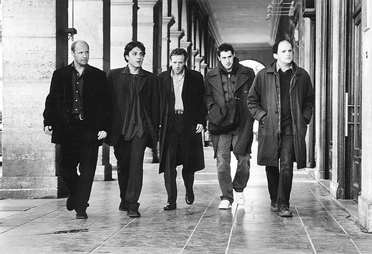An ambitious Shylock is left going through the motions with a Yiddish Shakespeare script
The title of Steve Suissa’s sentimental film refers to Shylock in “The Merchant of Venice,” a role coveted by a handsome Jewish actor named Maurice (Stéphane Freiss).
Perhaps it is deliberate that Suissa’s film arrives in theaters after the recent screen adaptation of Shakespeare’s “most troublesome play,” but alas, the timing does not work in this film’s favor. Ironically, “Le Grand Role” is all about bad timing.
The film’s plot involves Maurice landing the coveted role, only to have it snatched away because famed American director Rudolph Grichenberg (Peter Coyote) decides to go with a Hollywood name. Coincidentally or not, Al Pacino is mentioned as a suitable actor to play Shylock, although the star who actually snags the role in this film-within-a-film is fictional.
Just as Maurice learns of the loss of the part, another more serious tragedy takes place—his wife Perla reveals she is dying of cancer. Since she is happy for her husband’s success, and unaware of his bad fortune, Maurice must, with the help of his four actor friends, pretend to make the film to not upset his ailing wife.
Suissa, who also co-wrote the thin script, keeps the action nimble during the film’s first half when Maurice and his good-looking pals audition for the great role, but the film loses steam at mid-point, when the plot kicks into high gear. Only viewers amused by the fact that “The Merchant of Venice,” is being filmed not only in Paris, but also in Yiddish, will enjoy this forced French farce.
Sadly, “Le Grand Role” is toothless when it comes to satirizing Hollywood and the film industry, even though Coyote plays his part of a big American director with considerable relish. In contrast, the gentle prods of Maurice’s buddies and his agent—who drop names like Tom Cruise and Sean Connery to sound “Hollywood” and impress Perla—are not very funny.
Likewise, the broadly played gambit of pretending to film “Merchant” fails to engage. As Maurice and his friends prepare fake magazine articles, or shoot a bogus on-the-set interview, the film misses its chance to make Maurice into the actor he wants to be, someone who could give Perla a taste of the success he hopes one day to achieve. If Suissa is trying to convey a sense of Maurice’s guilt or sadness in his situation, it hardly registers, despite Freiss’ frequent hangdog expressions.
Throughout “Le Grand Role,” supporting characters talk about not being able to lie, and this clumsily reinforces the film’s themes of honesty and communication. The point is only truly brought home when Grichenberg meets with Perla to discuss her husband. But while effective, the scene is too little, too late.
All this is not to say that the film is without merit. The story of Maurice and his friends—none of whom are particularly talented, all of them waiting for their big break—unfolds nicely. These guys earn their money by dubbing a film, a sly commentary on the limits of their abilities.
When Maurice does land the great role, his friends celebrate by dancing around him in a hotel lobby. This is a charming moment, and it shows that Suissa can generate a few smiles.
Unfortunately, the film is never quite as winning as it aspires to be. The characters may be mildly endearing, but their situations strain credulity. Ultimately, “Le Grand Role” is something far less.
gaycitynews.com



































